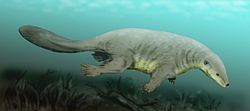Mammaliaformes
| Mammaliaformes Temporal range: Carnian – Present, 225–0 Ma |
|
|---|---|
 |
|
| Life restoration of Castorocauda lutrasimilis | |
| Scientific classification | |
| Kingdom: | Animalia |
| Phylum: | Chordata |
| Clade: | Synapsida |
| Order: | Therapsida |
| Suborder: | Cynodontia |
| Clade: | Mammaliamorpha |
| Clade: |
Mammaliaformes Rowe, 1988 |
| Subgroups | |
Mammaliaformes ("mammal-shaped") is a clade that contains the crown group mammals and their closest extinct relatives; the group radiated from earlier probainognathian cynodonts. It is defined as the clade originating from the most recent common ancestor of Morganucodonta and the crown group mammals; the latter is the clade originating with the most recent common ancestor of extant Monotremata, Marsupialia, and Placentalia. Besides Morganucodonta and the crown group mammals, Mammaliaformes includes Docodonta and Hadrocodium as well as the Triassic Tikitherium, the earliest known member of the group.
Mammaliaformes is a term of phylogenetic nomenclature. In contrast, the assignment of organisms to Mammalia has traditionally been founded on traits and, on this basis, Mammalia is slightly more inclusive than Mammaliaformes. In particular, trait-based taxonomy generally includes Adelobasileus and Sinoconodon in Mammalia, though they fall outside the Mammaliaformes definition. These genera are included in the broader clade Mammaliamorpha, defined phylogenetically as the clade originating with the last common ancestor of Tritylodontidae and the crown group mammals. This wider group includes some families that trait-based taxonomy does not include in Mammalia, in particular Tritylodontidae and Brasilodontidae.
Animals in the Mammaliaformes clade are often called mammaliaforms, without the e. Sometimes, the spelling mammaliforms is used. The origin of true mammals (Mammalia) extends back to the Jurassic, with extensive findings in the Late Jurassic outcrops of Portugal and China.
...
Wikipedia
